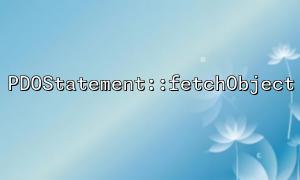When developing PHP applications, using PDO to interact with a database has become a common practice. PDOStatement::fetchObject is a very useful function that converts query results into objects row by line so that we can operate more easily. However, when we process large amounts of data, the fetchObject function may encounter performance bottlenecks, resulting in slower processing. This article will discuss some optimization tips to help you solve the performance problems of PDO when dealing with big data.
When using PDOStatement::fetchObject , PHP maps each row of database results into an object. Although this operation performs well in most cases, when the data volume is very large, the following problems will occur:
High memory footprint : Every time fetchObject is called, an object is created, which consumes a lot of memory.
Slow response : Under large data sets, reading row by row and mapping into objects can appear very slow, especially when the amount of data reaches tens of thousands of rows.
Database connection takes up a long time : If the query is not optimized properly, too long execution time may cause the request to time out.
To optimize performance, we can take some steps to avoid these bottlenecks, and here are a few common solutions.
PDOStatement::fetchObject converts query results into an object. Although this method is more in line with the style of object-oriented programming, generating a large number of objects may bring unnecessary overhead when dealing with big data. If it's just for accessing the database field, using PDO::FETCH_ASSOC may be more efficient, which returns each row result as an associative array, rather than an object.
Sample code:
<?php
// create PDO Example
$pdo = new PDO('mysql:host=gitbox.net;dbname=test', 'username', 'password');
// Execute a query
$stmt = $pdo->query('SELECT * FROM large_table');
// use FETCH_ASSOC replace FETCH_OBJ
while ($row = $stmt->fetch(PDO::FETCH_ASSOC)) {
// Processing data
echo $row['column_name'] . "\n";
}
?>
In this way, we avoid creating an object for each row of data, thus reducing memory usage.
If a large amount of data is queried at one time, it may have a great impact on the performance of the database and application. An effective approach is to use LIMIT to query data in batches. This method can divide the large data set into multiple small batches, load and process one by one, thereby avoiding excessive data loading at one time.
Sample code:
<?php
$pdo = new PDO('mysql:host=gitbox.net;dbname=test', 'username', 'password');
$batchSize = 1000; // Each query1000Data
$offset = 0;
do {
$stmt = $pdo->prepare('SELECT * FROM large_table LIMIT :limit OFFSET :offset');
$stmt->bindValue(':limit', $batchSize, PDO::PARAM_INT);
$stmt->bindValue(':offset', $offset, PDO::PARAM_INT);
$stmt->execute();
// Process each batch of data
while ($row = $stmt->fetch(PDO::FETCH_ASSOC)) {
echo $row['column_name'] . "\n";
}
$offset += $batchSize;
} while ($stmt->rowCount() > 0); // If there is still data,Let's continue to query
?>
In this way, the system loads only a small portion of data at a time, which can significantly reduce memory pressure.
Another way to improve performance is to use PDO::FETCH_BOUND , which allows you to bind query results directly to PHP variables, avoiding creating intermediate arrays or objects. This is more efficient than calling fetchObject or fetchAssoc every time, especially when the data volume is very large.
Sample code:
<?php
$pdo = new PDO('mysql:host=gitbox.net;dbname=test', 'username', 'password');
$stmt = $pdo->query('SELECT id, name FROM large_table');
$stmt->bindColumn('id', $id);
$stmt->bindColumn('name', $name);
while ($stmt->fetch(PDO::FETCH_BOUND)) {
echo "ID: $id, Name: $name\n";
}
?>
In this way, each time fetch is called, the values of id and name are bound directly to the variables $id and $name , without additional memory overhead to create arrays or objects.
For high-frequency and large-data operations, the overhead of database connections is also an issue that cannot be ignored. It is possible to consider using persistent connections or connection pooling techniques to reduce the time consumption caused by connection establishment and destruction.
<?php
$pdo = new PDO('mysql:host=gitbox.net;dbname=test', 'username', 'password', [
PDO::ATTR_PERSISTENT => true, // Enable persistent connections
PDO::ATTR_ERRMODE => PDO::ERRMODE_EXCEPTION
]);
// Subsequent database operations
?>
Persistent connections can be reused across multiple requests, reducing the overhead of frequent creation and destruction of database connections and improving overall performance.
When using the PDOStatement::fetchObject function, we can optimize performance by:
Use PDO::FETCH_ASSOC instead of PDO::FETCH_OBJ to avoid unnecessary object creation.
Query data in batches to reduce the amount of data per query.
Use PDO::FETCH_BOUND to directly bind the query results to the variable.
Enable persistent connections to reduce database connection overhead.
Through these optimization methods, the performance during large-data query can be effectively improved, memory usage can be reduced, and response speed can be improved. If you encounter performance bottlenecks, try these methods to optimize your database operations.
Related Tags:
PDOStatement














